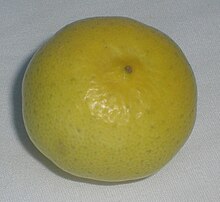Key lime
| Key lime | |
|---|---|
 |
|
| Ripe yellow Key lime. | |
| Scientific classification | |
| Kingdom: | Plantae |
| (unranked): | Angiosperms |
| (unranked): | Eudicots |
| (unranked): | Rosids |
| Order: | Sapindales |
| Family: | Rutaceae |
| Genus: | Citrus |
| Species: | C. × aurantiifolia |
| Binomial name | |
|
Citrus × aurantiifolia (Christm.) Swingle |
|
The Key lime (Citrus × aurantiifolia) is a citrus hybrid (C. micrantha x C. medica) with a globose (spherical shaped) fruit, 2.5–5 cm in diameter (1–2 in), that is yellow when ripe but usually picked green commercially.
It is smaller and seedier, with a higher acidity, a stronger aroma, and a thinner rind, than that of the Persian lime (Citrus × latifolia). It is valued for its unique flavor compared to other limes. The name comes from its association with the Florida Keys, where it is best known as the flavoring ingredient in Key lime pie. It is also known as West Indian lime, bartender’s lime, Omani lime, or Mexican lime, the last classified as a distinct race with a thicker skin and darker green color. Philippine varieties have various names, including dayap and bilolo.
The English word "lime" was derived, via Spanish then French, from the Arabic word ليمة līma (Persian: لیمو limu). "Key" is from Florida Keys, where the fruit is naturalized. The Oxford English Dictionary dates the first use of "key lime" to 1905, in an issue of Country Gentleman, which described the fruit as "the finest on the market. It is aromatic, juicy, and highly superior to the lemon."
...
Wikipedia
